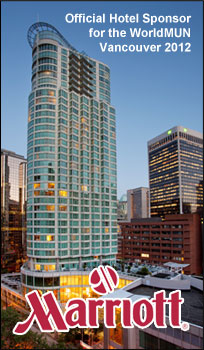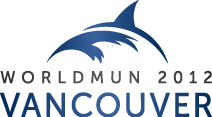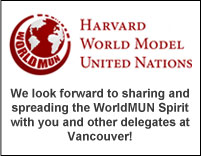Events & Activities
Nightly Social Events Workshops & Seminars In-Conference Trips Pre-Conference Trips &
Post - Conference Trips Lunch with UBC's Graduate Business School V-Project Contest
Workshops and Seminars

Go Beyond - Tomorrow's Leaders With a theme of “Go Beyond-Tomorrow's Leaders”, the Workshops and Seminars Program aims to inspire the delegates as leaders of tomorrow by providing those brightest young minds with the opportunities to engage in dialogue with leading scholars, politicians, diplomats and business leaders. We plan on fostering these meaningful discussions through an additional series of workshops and seminars touching the most critical themes and topics, as we believe tomorrow’s leaders have to be equipped with focused views based on an insightful grasp of major developments of our time.
The Workshops and Seminars Program is held on Monday, March 12th and Wednesday, March 14th. All sessions are held at the West Building of the Vancouver Convention Centre and are FREE of charge to delegates, visiting faculty advisors, volunteers, UBC and other local college/university students. Please register ahead of time to ensure your spot.
Dress code at all Workshops and Seminars sessions is Business Formal or Business Casual.
Go Beyond - Tomorrow's Leaders Workshop & Seminar Sessions on Monday, March 12th from 12.30 pm to 2.00 pm (Free!):
- Guest Speaker from the United Nations
- Location: West 111 - 112, Vancouver Convention Centre
- Click here to register for this session.
- Life as an Ambassador
- Location: West 114 - 115, Vancouver Convention Centre
- Click here to register for this session.
- Asia in Focus
- Location: West 113, Vancouver Convention Centre
- Click here to register for this session.
- International Instability: IDP, Drug Economies, Conflict Regions, Human Security, and Third Parties
- Location: West 213, Vancouver Convention Centre
- Click here to register for this session.
- Women’s Leadership
- Location: West 224, Vancouver Convention Centre
- Click here to register for this session.
- Eurozone Crisis and its Implications for Global Currency Relations
- Location: West 214, Vancouver Convention Centre
- Click here to register for this session.
- United Nations and the Millennium Development Goals
- Location: West 121 - 122, Vancouver Convention Centre
- Click here to register for this session.
Workshop & Seminar Topics and Speaker Biographies Sessions on Monday, March 12th from 12.30 pm to 2.00 pm:
- Guest Speaker from the United Nations (West 111 - 112, Vancouver Convention Centre)
- Have you ever wonder what it would be like to work for/in the United Nations?
- Featuring Maher Nasser, the Director of Outreach from the United Nations. His experiences and insights are not to be missed. Maher Nasser has over 24 years of work experience in the United Nations System during which he has worked in various capacities in Gaza, Jerusalem, Amman, Cairo, Vienna and New York. Prior to assuming his current post as Director of the Outreach Division in the Department of Public Information (DPI) in New York, Mr. Nasser was the Director of the United Nations Information Service (UNIS) in Vienna from July 2008 and Director of the United Nations Information Centre (UNIC) in Cairo from January 2006. Before joining DPI, Mr. Nasser was the Chief of the New York Liaison Office for the United Nations Relief and Works Agency for Palestine Refugees in the Near East (UNRWA). He also worked for UNRWA, in Vienna and Amman and served as an Associate Information Officer for the United Nations Drug Control Programme in Vienna (now UNODC). Prior to joining the United Nations, he worked for two non-governmental organizations based in Jerusalem.
- Life as an Ambassador (West 114 - 115, Vancouver Convention Centre)
- For those of you who are interested in foreign affairs and government services, have you ever pondered about a diplomatic career? Come to this panel, talk to the ambassadors and be inspired by their stories.
- Jeremy Kinsman retired from the Canadian Foreign Service in 2006. Over his 40 years of service, he was Chairman of Policy Planning and later Political Director before being named Canada’s Ambassador in Moscow in 1992. He was subsequently Ambassador in Rome (1996-2000), High Commissioner in London (2000-2002), and Ambassador to the EU in Brussels (2002-2006). Earlier postings abroad included being Deputy Permanent Representative to the UN in New York and Minister for Political Affairs in Washington. From 1985 to 1989 he was the senior federal official responsible for Cultural Affairs and Broadcasting where he was responsible for preparing the still-current Broadcasting Act, on which he continues to consult. Today Ambassador Kinsman is Lead Writer for Foreign Affairs for Policy Options magazine, a regular commentator for CBC News (www.cbc/news.ca), and is published widely elsewhere, such as in the International Herald Tribune.
- Earl Drake is a honorary professor at the Institute of Asia Research at the University of British Columbia. Mr. Drake has been a major figure in Canada-Asia relations for forty years, serving as Canada’s Ambassador to China (1987-90), Indonesia (1982-83), Assistant Deputy Minister for Asia Pacific in the Department of Foreign Affairs and International Trade, and Vice-President of Canadian International Development Agency (CIDA). He also served as Canadian representative in the governing councils of the Organization for Economic Co-operation and Development in Paris and World Bank in Washington. He later directed the China Council for International Cooperation on Environment and Development while at Simon Fraser University. Currently he is a Vice Chairman of the Canada-China Business Council and a director of Silvercorp Metals Inc., China’s leading silver producer. Drake is the author of his autography: A Stubble-Jumper in Striped Pants: Memoirs of a Prairie Diplomat.
- Paul Meyer is Fellow in International Security and Adjunct Professor of International Studies at Simon Fraser University and a Senior Fellow with The Simons Foundation. Prior to assuming his current appointments in 2011, Mr. Meyer had a 35-year career with the Canadian Foreign Service. Mr. Meyer had diplomatic assignments in Oslo, Moscow, Brussels (NATO), Washington, Tokyo and from 2003-2007 in Geneva where he served as Canada’s Ambassador and Permanent Representative to the United Nations and to the Conference on Disarmament. At the Department of Foreign Affairs and International Trade’s HQ, Meyer held a variety of positions including Director General for International Security (1998-2001) and Director General for Security and Intelligence (2007-2010). Throughout his work, Meyer has sought to promote international security by means of creative diplomacy. He currently is teaching a graduate course on multilateral diplomacy at SFU’s School for International Studies and is engaged in research and writing on issues of nuclear non-proliferation and disarmament, outer space security and cyber security.
- Asia in Focus (West 113, Vancouver Convention Centre)
- Some claim that the economic downturn in Europe and North America has accelerated the global power shift from the West to Asia. Others suggest that with increasing political and economic influence, Asia faces a set of new challenges. For instance: environmental degradation calls into attention the questions of economic sustainability; while political opinion on social and economic inequality in countries such as China remains critical. Not forgetting territorial disputes such as those in the South China Sea, internal conflicts in countries such as Afghanistan and Myanmar, and volatile regimes in North Korea and Iran - all of these pose potential threats to regional peace and global stability. Will the 21st century belong to Asia? Will sustained economic growth in Asia be realized despite mounting social and political problems? In the face of the aforementioned security challenges, will peace prevail as it did in the past three decades? This panel will attempt to answer those questions through a discussion joined by leading scholars on Asia affairs.
- Paul Evans is Professor and Director of the Institute of Asian Research at the University of British Columbia. He earlier served as the Co-CEO of the Asia Pacific Foundation of Canada and held academic appointments at York University and Harvard University. He is a specialist on the international relations of Eastern Asia, and has written several books on the topic. His detailed previous teaching and administrative appointments were as Assistant, Associate and Professor, Department of Political Science, York University, 1981-97; Director, University of Toronto - York University Joint Centre for Asia Pacific Studies, 1991-96; Visiting Professor, Asia Center, Harvard University, 1997-99; Acting Director, Liu Institute for Global Issues, 2004-5; and Co-CEO and Chairman of the Executive Committee, Asia Pacific Foundation of Canada, 2005-08. He is currently teaching graduate seminars at UBC and Hong Kong University on Global China and World Order.
- Yuen Pau Woo is President and CEO of the Asia Pacific Foundation of Canada. Mr. Woo is an advisor to the Shanghai WTO Affairs Consultation Centre and the Canadian Ditchley Foundation. He is also on the Global Council of the Asia Society in New York, a member of the Greater Vancouver Advisory Board for the Salvation Army, and a board member of the Mosaic Institute. Since 2006, Mr. Woo has been coordinator of the State of the Region Report, the flagship publication of the Pacific Economic Cooperation Council (PECC). He is also on the editorial board of Pacific Affairs. He was educated at Lester B. Pearson College, Wheaton College, the University of Cambridge, and the University of London. Mr. Woo has previously worked as a consultant on international marine affairs and as an economist for the Monetary Authority of Singapore and the Government of Singapore Investment Corporation.
- John Harriss is the Director of School of International Relations at Simon Fraser University, Canada. His research focuses include Political Economy of development, Indian politics, political participation and civil society in India, social policy in India and other ‘emerging economies’, institutional theories, and agrarian change (especially in South India). He is the author of academic books and journals of many, including Globalization and Labour in China and India: Impacts and Responses of 2010 and Power Matters: Essays on Institutions, Politics and Society in India.
- International Instability: IDP, Drug Economies, Conflict Regions, Human Security, and Third Parties (West 213, Vancouver Convention Centre)
- With the collapse of old regimes, decreasing confidence in the global market, new spheres of influence and the ever-increasing number of conflict zones, the world today is hard to understand. Through the turmoil, it is inevitable to pause and examine the impact such instability has on the individual. The responsibility of ‘governance’ is no longer rested in the hands of governments. It seems that international organizations, multinational corporations, and non-governmental organizations now possess the resources and means to take more active roles to ensure that the individual is protected. What should their roles encompass? How will the media interact with these actors in an exercise of power-sharing? How will this affect the micro-relationships within conflict regions or societies? This panel aims to explore what to do with those left behind and why some regions or places are remain more vulnerable than others.
- Robert M. A. Crawford is a lecturer in the Humanities (Arts One) and Political Science at the University of British Columbia and specializes in the teaching and research of International Relations, Political Philosophy, and Global Political Economy. His publications include Regime Theory in the Post-Cold War World (Dartmouth 1997) and Idealism and Realism in International Relations (Routledge 2001).
- Philippe Le Billon is an Associate Professor at the University of British Columbia with the Department of Geography and the Liu Institute for Global Issues. Before joining UBC, he was a Research Associate with the Overseas Development Institute (ODI) and the International Institute for Strategic Studies (IISS). He holds an MSc, MBA and DPhil (Oxford). Working on linkages between environment, development and security, he has published widely on natural resources and armed conflicts, the political economy of war, and corruption. His two latest books are Wars of Plunder: Conflicts, Profits and the Politics of Resources (Columbia UP, 2012) and The Geopolitics of Oil (Polity Press, 2012 with Gavin Bridge).
- Brian L. Job (PhD, Indiana University) is a Professor of Political Science and Director of the Security and Defence Program of the Centre of International Relations at the University of British Columbia. Since 1992, he has also served as Director of the Centre of International Relations at the Liu Institute at UBC. His teaching and research interests are in international security studies, broadly conceived. His work focuses upon the evolving security order of the Asia Pacific, on intrastate conflict, and on Canadian foreign and defence policy. The theoretical/conceptual puzzles that interest him include the evolution of norms for security communities, multilateralism, regionalism, arms acquisition processes, and the security dilemmas of and within “Third World” states.
- Women’s Leadership (West 224, Vancouver Convention Centre)
- In the 21st century, there is still a noticeable difference in the number of females in positions of power and /or leadership. Why is this still the case? What has allowed those few women to gain leadership positions and what can we learn from them? Conversely, why is there still a disproportional representation of female leadership in the corporate sector, politics etc? This workshop will invite women leaders to explore the limited world of female leadership and look into the struggles that they still face today.
- Naomi Yamamoto was appointed Minister of Advanced Education on March 14, 2011. She also served as Minister of State for Building Code Renewal and Minister of State for Intergovernmental Relations after being elected as MLA for North Vancouver-Lonsdale in 2009. Naomi is a UBC graduate, with a degree in film and television that paved the way for a 21-year career as the President and owner of Tora Design Group in North Vancouver. Naomi’s experience as an entrepreneur led to her work with her local business community as the president and general manager of the North Vancouver Chamber of Commerce and as Chair of the B.C. Chamber of Commerce. She has also served on the board of the North Shore Credit Union and the Vancouver Coastal Health Authority, and was President of the Gordon and Marion Smith Foundation.
- Eurozone Crisis and its Implications for Global Currency Relations (West 214, Vancouver Convention Centre)
- The aftermath of the financial crisis from 2008 brought about another crisis, this time in the Eurozone. A new round of currency volatility has the potential to further undermine global economic growth and it is apparent that faith in global markets has been irrevocably wavered. The intense search of 'safe havens' by international investors has generated short-term capital inflows to all sorts of countries like Brazil and Switzerland, and resulted in bold as well as desperate actions on the side of policy-makers. Simultaneously, the US-Dollar experiences a high, despite unsound economic fundamentals. All this refers to the build-up of new tensions. The seminar will address the state of global currency relations and discuss the various proposals for a global monetary regime.
- Professor Xu Hongcai is a visiting scholar at the Institute of Asia Research at the University of British Columbia. Prof. Xu serves as Deputy Director of the Information Department of China Center for International Economic Exchange (CCIEE), a key think tank based at Beijing. He is also a professor in finance of the Capital University of Economics and Businesses (CUEB), special professor of the Peking University, specialist director of the Securities Association of China. Before joining CCIEE, he served a variety of senior posts at several prestigious companies, including director of the Securities and Futures Research Center at the CUEB, senior manager of venture capital and securities companies, official of the People’s Bank of China, assistant engineer of China Petrochemical Corporation.
- Kurt Hübner is a professor of European Studies and the Jean Monnet Chair at the Institute for European Studies at the University of British Columbia. Central to Hübner’s research are topics of global and European currency regimes, international regimes of foreign direct investment, and the relations between innovation and sustainability. His latest research focuses on the economic and socio-political foundations of technical innovations in a transatlantic perspective. Currently he is working on a project on currency competition and currency co-operation, which analyses the relations between the US Dollar, the Euro and the Japanese Yen.
- United Nations and the Millennium Development Goals (West 121 - 122, Vancouver Convention Centre)
- In the year 2000, 193 countries ratified the United Nations Millennium Declaration, which consisted of 8 international development goals. Then in 2001, the UN Secretary General presented a “Road Map Towards the Implementation of the United Nations Millennium Declaration” to be completed by 2015. With only 3 years left, where do we stand today? How successful have we been and what is left to be done? This workshop is designed to explore these 8 goals and discuss ways to achieve them.
- Chris Erickson studies various aspects of industrial relations in the local, national and world economies. His interests include Labour Relations, Negotiation, International Comparative Industrial Relations, Public Policy, Collective Bargaining, Wage Determination, Labor Standards, Immigrant Workers, and Employer-Provided Training. His research focuses on comparative industrial relations systems, industrial relations and labour market transformation in different regions of the world, wage determination, collective bargaining, innovations in union organizing, and skills development. He has had long associations with the UCLA - National University of Singapore Global Executive MBA, the UCLA Institute for Research on Labor and Employment, the UCLA Center for International Business Education and Research and the Labor and Employment Relations Association. He has been at UCLA Anderson since 1991, and was previously a faculty member at the Cornell Industrial and Labor Relations School. He is a graduate of John W. North High School in Riverside, California, and has a B.A from Yale University and a PhD in Economics from MIT.


Important Reminders Before Departure to Vancouver | 6 March 2012
Wondering how to get around Vancouver? Wondering what identification and
clothing you need to bring? Click here to read more.
Itinerary for WorldMUN 2012 | 2 March 2012
The daily itinerary for the 21st World Model United Nations Conference in Vancouver has been released. To view the full schedule, click here.
A Letter from United Nations Secretary-General BAN Ki-moon | 29 February 2012
"I am counting on your continued leadership and engagement. By participating in this Model United Nations, you will hone your negotiating skills and gain insights into what it takes to achieve consensus and progress...you can make your voices heard and drive political and social change...". Read the full letter here.


























